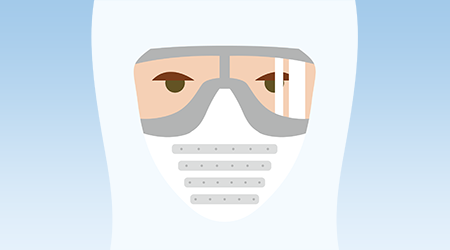
Just like the SARS outbreak of 2002 and the swine flu pandemic of 2009 did before, the new coronavirus (COVID-19) has sent much of the world into a panic. From its start in Wuhan, China, to its spread in the United States, the new coronavirus has, without hyperbole, changed the way people live.
First and foremost, there is the threat to human lives. In the first days of spring, as a growing list of states were instituting stay-at-home orders, more than 360,000 cases of the infection were confirmed worldwide, resulting in more than 16,000 deaths, according to Johns Hopkins University. The spread of sickness and loss of life resulted in crippling fear. The U.S. economy continues to see-saw as panic grows. Hand sanitizer and antiviral masks are sold out — some people even hoarding the product in an effort to push a crooked profit online.
A number of manufacturers across very different industries have stepped up to try and curtail the damage done by all the mass purchasing. For example, a number of vodka and whiskey distilleries in the United States are using their alcohol supply to make hand sanitizer, which is then donated or sold. LVMH, the company that produces fragrances for Louis Vuitton and Christina Dior, reportedly used its factories in France to help distribute hand sanitizer to hospitals throughout that region.
In jan/san, the run on toilet paper has been a time to shine for Marcal Paper, a New Jersey paper mill that burned down in January 2019. The mill reopened in January 2020, just weeks before COVID-19 became a major issue in the United States. When toilet paper supplies plummeted nationwide in mid-March, Marcal began producing 24/7, so that it could make about 170 tons of paper towel and toilet paper per day, reports northjersey.com.
Building service contractors that Sanitary Maintenance spoke to say they have been getting by with the supplies they have in stock and that their distributors have been mostly able to fill any orders they needed to make. However, there is the expectation that issues could arise as the weeks progress.
Facility executives have been asking for more frequent cleaning and special services in light of the pandemic. New clients are asking for services as the situation rolls on, too. While the increased business is great for BSCs, it will require the use of more supplies.
Building service contractors expect it to become more difficult to obtain cleaning supplies as time goes on. They say their distributors have been warning that the supply chain has been stretched so thin that not all deliveries before May can be promised.
Given the situation, personal protective equipment (PPE) has been in high demand, but short supply as those products are first going to hospitals and healthcare facilities. It’s fair to assume that end users will especially have to stock up on these supplies moving forward so they aren’t in trouble when another pandemic hits.
Understand The Enemy
In order to get where they need to be — both now and in the future — jan/san distributors need to not only supply customers with products, but the exact products they need for their particular business.
COVID-19 might be known as the new coronavirus, but coronavirus itself isn’t new. In fact, severe acute respiratory syndrome is a form of the coronavirus.
"What the 2002 SARS outbreak taught us is that the spread of pathogens has to do with proximity of non-infected people to infected people, traveling practices, and quarantining the traveling and sick," says Heidi Wilcox, microbiologist and president of Wilcox EVS, Haverhill, Massachusetts. “Unless there are sick people in your facility, the way to protect clients and the public from coronavirus is to make sure you have good daily green cleaning and infection control processes and procedures in place."
The new coronavirus appears to be "more hearty" than SARS and Middle Eastern Respiratory Syndrome (MERS) because it is believed to survive longer on surfaces and in the air, and is therefore more easily transmitted, says Dr. Chuck Gerba, a microbiologist at the University of Arizona.
The good news is COVID-19 is not resistant to disinfectants because it’s an enveloped virus. This means that when coronavirus is attacked by a good disinfectant, it dies, says Gerba. Luckily, disinfectant just happens to be a staple of the professional cleaning routine.
Cleaning, Disinfecting Both Vital In COVID-19 Protocol

 Celebrating BSCAI's 60th Anniversary eBook
Celebrating BSCAI's 60th Anniversary eBook The Down and Dirty on Cleaning in Virus Season
The Down and Dirty on Cleaning in Virus Season How Surfactant Use is Expanding in Commercial Cleaning
How Surfactant Use is Expanding in Commercial Cleaning